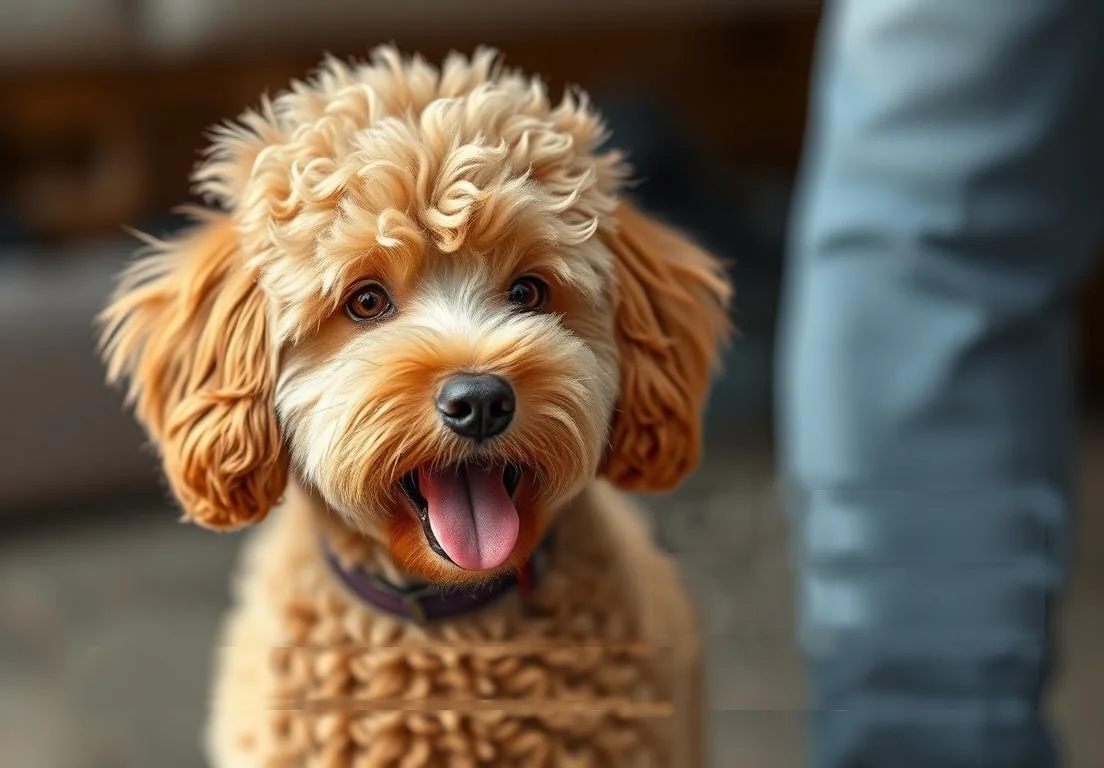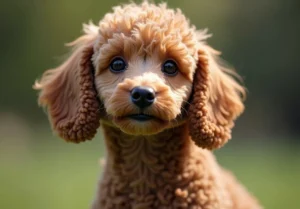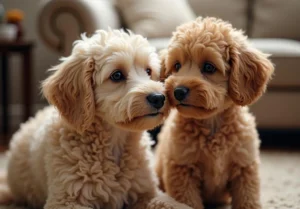Disclosure: We may earn a commission from helpful, relevant links in our content. No cost to you. See our privacy policy.
Poodles stand out in the canine world for their intelligence and charm, making them one of the most beloved breeds among dog enthusiasts. Their distinctive curls and graceful demeanor turn heads wherever they go, while their sharp minds enable them to learn quickly and adapt seamlessly to various situations.
Poodles are not just pets; they’re intelligent and elegant companions that can enrich your life in numerous ways. If you’re curious about what makes them such exceptional friends and want to learn how to care for them, there’s a wealth of insightful details waiting for you in this guide.

What Makes Poodles So Intelligent?
Poodles are often celebrated as one of the brightest dog breeds, and for good reason. Their intelligence stems from a combination of genetic traits and a history of being bred for specific tasks, like hunting and retrieving. This versatility means they’re not just quick learners; they thrive on mental stimulation and adaptability.
Their problem-solving skills are particularly impressive. Poodles can learn commands in just a few repetitions, making obedience training a rewarding experience for both the dog and the owner. This rapid learning isn’t just for show—it translates to everyday life. For instance, many poodles can easily learn to navigate complex commands or tricks that other breeds may take longer to master.
Poodles also excel in lifestyle integration. Their high intelligence helps them read their environments and adjust behaviors accordingly. Whether it’s picking up on their owner’s mood or adapting to new situations, their social intelligence plays a key role in creating a strong bond with their humans. Owners often find that their poodles can sense when they’re feeling down and may offer comfort in their unique, loving ways.
Poodles truly shine in training bustling activities, making them perfect choices for various dog sports. Agility, obedience, and even advanced tricks are arenas where they demonstrate their mental acuity. Engaging in such activities not only keeps your poodle sharp but strengthens the owner-dog relationship.
In essence, the intelligence of poodles is beneficial not just for mastering commands but also for enhancing overall companionship. These dogs are ready to lift spirits and adapt to their owners’ lifestyles, making them rewarding pets for those who thrive on mutual understanding and interaction.
The Various Sizes of Poodles
Poodles come in three distinct sizes: Standard, Miniature, and Toy, each boasting unique characteristics that influence their care and companionship dynamics.
Standard Poodles are the largest of the trio, standing over 15 inches tall at the shoulder.
They possess a regal stature and often demand more space, making them ideal for families or individuals who have room to accommodate a bigger dog. Standard poodles are known for their athleticism and can thrive in active households. They require regular exercise, and their friendly nature makes them great companions for outdoor activities.
Miniature Poodles strike a balance between size and affection. Standing between 10 to 15 inches, they’re perfect for families seeking a companion that doesn’t require as much space as the standard version. Miniatures retain that high energy and intelligence, making them just as trainable and eager to engage. They adapt well to apartment living, provided they get their daily dose of exercise and mental challenges.
Toy Poodles , under 10 inches tall, bring a delightful charm to the table. Compact and cuddly, these little ones pack a lot of personality into their small frames. They’re perfect for those who may have limitations on space but still desire an intelligent and affectionate companion. Despite their size, toy poodles need plenty of socialization and mental engagement to stay happy and healthy.
One unique insight is that grooming needs can vary among the sizes. While all poodles require regular grooming due to their curly coats, the Standard Poodle may need more intensive care due to its larger size and potential for tangles. Toy and Miniature Poodles, being smaller, may find it easier to stay on top of grooming routine at home, but they still need consistent professional grooming to keep their coats in prime condition.
Understanding these size differences is crucial for potential poodle owners, as each size brings its charm, energy level, and specific care requirements to the table.
Poodling Around: Grooming Essentials
Taking care of a Poodle’s luxurious coat isn’t just about aesthetics; it’s key to their health and comfort. Their iconic curls might look fabulous, but they come with some serious grooming responsibilities.
First off, regular brushing is essential. Aim for at least 2-3 times a week to prevent mats and tangles.
A slicker brush works wonders on their curly fur, helping to detangle without damaging the coat. Another handy tool is a metal comb, which can be used to check for any tough knots that need more attention.
Don’t skip the bathing routine either; Poodles require baths every 4-6 weeks, depending on how active they are.
Use a gentle, dog-specific shampoo to keep their skin and coat healthy.
After a bath, drying can be a chore, but it’s essential to use a good quality dog dryer rather than a human hair dryer, as it’s designed to be quieter and safer for pets.
The frequency of bathing a poodle can vary based on individual factors such as their activity level, coat length, and health status. Generally, most adult poodles benefit from bathing every 6-8 weeks, while more active dogs or those in dirty environments may need more frequent baths. For toy poodles, bathing every 3-4 weeks is often recommended, depending on similar factors.
Lastly, make sure to keep an eye on their ears. Poodles are prone to ear infections because of their floppy ears. Regularly checking and cleaning them with a vet-recommended solution can prevent issues down the line.
Pro tip: Consider scheduling grooming sessions with a professional every few months. They can help with clipping, which is vital for maintaining that snazzy Poodle look!
How to Train a Poodle Effectively
Harnessing a Poodle’s intelligence can be an enjoyable and rewarding experience. These dogs aren’t just highly trainable; they actually thrive on learning. Start with basic commands like “sit”, “stay”, and “come”. Poodles tend to retain information quickly, so keep training sessions short and fun—ideally around 5-10 minutes—allowing them to absorb and engage without losing interest.
Utilizing positive reinforcement works best—think treats, praise, and plenty of affection. Poodles respond incredibly well to encouragement, so ensure you’re celebrating their wins, no matter how small. Additionally, mixing in fun activities, such as playing fetch or agility training, can keep their minds sharp and stimulate their curiosity.
Once they’ve mastered the basics, teaching them tricks can be a great next step. Some amazing tricks, like “spin” or “play dead,” will not only impress your friends but also channel their energy positively.
Consider introducing advanced techniques like clicker training. This method uses a sound to mark a desired behavior, followed by a treat, reinforcing good habits even more effectively.
Lastly, socialization is crucial. Exposing your Poodle to different environments, people, and pets can help alleviate anxiety and improve their interaction skills. This multifaceted approach to training ensures your Poodle not only learns commands but also becomes a well-rounded companion.
The Ideal Environment for Your Poodle
Poodles thrive in environments that cater to their intellectual and social needs. Whether you reside in a cozy apartment or a spacious home, there are ways to shape your space to suit a Poodle’s lifestyle.
For starters, Plenty of space is key. While Poodles aren’t overly active indoors, they do need room to move around and play. Make sure they have access to a safe area where they can stretch their legs. A small yard will do just fine, but a larger outdoor space is a bonus for those energetic spurts.
Stimulation is crucial . Fill their environment with interactive toys, puzzles, and engaging games to keep their minds sharp. Poodles are known for their high intelligence, so you’ll want to keep boredom at bay. Dedicate a corner of your home for a play area, stocked with toys that challenge them mentally.
Consider social interaction as well. Poodles are social creatures and love being around their humans. Create opportunities for them to interact with family members and other pets. If you’re often out, think about daycare services or playdates to ensure they get the socialization they crave.
Lastly, ensure that your Poodle has a cozy sleeping space. A comfortable bed in a quiet area will help them feel secure. Just keep in mind that they’re sensitive to extreme temperatures, so moderating the room’s climate is essential. A happy Poodle makes for a joyful home!
Common Health Concerns for Poodles
Poodles are generally healthy, but they can be prone to certain health issues that pet owners should be aware of. Regular vet check-ups and a proactive approach to their well-being can make a big difference.
One common condition seen in Poodles is hip dysplasia, which can lead to arthritis.
Hip dysplasia is a skeletal condition that occurs when the hip joint does not form properly, leading to joint deterioration and potential pain as the dog ages. Approximately 11.9% of Poodles suffer from at least mild hip dysplasia, which may result in a grinding motion in the joint and can manifest as symptoms like limping, decreased range of motion, and loss of interest in exercise. Without treatment, the condition can worsen and lead to joint inflammation and arthritis later in life. Treatment options include weight management, reduced exercise, physical therapy, anti-inflammatory medications, and in some cases, surgical intervention. For further reading, you can check out more details on this condition here.
Keeping your pup at a healthy weight and providing low-impact exercise can help mitigate this risk. Supplements, like glucosamine, might also be recommended by your vet to support joint health.
Another issue is bloat, a serious condition that can affect deep-chested breeds like Poodles. Signs of bloat include restlessness and a distended belly. Feeding smaller, more frequent meals can help reduce the chances of this happening.
Bloat occurs when the stomach fills with gas and expands, potentially leading to life-threatening conditions. By feeding smaller meals, you decrease the volume of food in the stomach at any one time, which can help reduce the risk of excessive gas buildup. For example, if a Poodle typically eats 2 cups of food a day, splitting that into four 0.5-cup meals throughout the day may help keep the stomach less distended, thereby lowering the risk of bloat. This approach is logical because smaller portions are less likely to stretch the stomach significantly, thus mitigating the likelihood of bloat occurring.
Eye problems , such as cataracts and progressive retinal atrophy, are also concerns. Routine eye examinations can help catch potential issues early.
Don’t overlook skin conditions, which Poodles are prone to due to their curly coats. Regular grooming is vital to avoid matting and skin infections.
Here are a few additional health tips for Poodle owners:
- Dental care: Regular brushing and dental check-ups can prevent periodontal disease.
- Hydration: Always have fresh water available to maintain hydration, especially during active play.
- Exercise: Regular walks and playtime are essential for mental and physical health.
Staying informed about these health matters and maintaining a routine will help your Poodle lead a happy, healthy life.
Poodles in Popular Culture
Poodles often strut their stuff on the big screen, appearing not just as pets but as symbols of wealth and sophistication.
Think of “The Aristocats,” where a poodle named Duchess showcases not only elegance but also deep-rooted charm. In the world of television, poodles often grace shows that highlight high society, like “The Real Housewives” series, where they’re seen as aspirational companions—more than just pets, but lifestyle icons. Social media reflects this trend, with countless Instagram accounts dedicated to well-groomed poodles, parading their intricate hairstyles and fashionable outfits.
Moreover, poodles have influenced the fashion industry, even attending runway shows and becoming a favorite in high-end pet fashion lines. Their unique intelligence and aesthetic appeal have made them symbols of style, even appearing in art—think famous paintings where they’re prominently featured alongside their owners. With their presence in pop culture, poodles have proven they’re not just great companions but also trendsetters, shaping perceptions around dog ownership and social status in the modern world.
Fun Facts About Poodles
Poodles are more than just adorable fluffballs. Here’s a deeper dive into some fascinating trivia that reveals their rich history and quirky traits:
-
Water Retrievers: Originally bred in Germany, poodles were hunter’s companions, primarily used for retrieving waterfowl from lakes and rivers. Their proficiency in water is often overlooked.
-
Three Sizes: Poodles come in three sizes—Standard, Miniature, and Toy—each showcasing a distinct personality and energy level, yet all share the same intelligence and elegance.
-
Hypoallergenic Coats: If you’re sensitive to allergens, you’ll appreciate that poodles shed less and have hypoallergenic coats, making them a practical choice for those with allergies.
-
Exceptional Intelligence: Often ranking in the top three smartest dog breeds, poodles enjoy learning tricks and commands, and they excel in obedience training.
-
Celebrity Status: Countless celebrities have poodles, from Marilyn Monroe to Julia Roberts, proving their allure isn’t just for the average pet owner.
-
Unique Grooming Styles: The poodle cut isn’t just for looks; the distinct style was initially designed to help them swim better, keeping their joints warm while allowing flexibility.
Poodles embody a rich legacy combining intelligence, skill, and fluffiness. Whether you’re considering adopting one or just interested in their quirks, there’s plenty to love about these elegant companions.
Unique Activities to Enjoy with Your Poodle
Exploring creative activities with your Poodle not only keeps their mind and body fit but also strengthens your bond. Given their intelligence, Poodles thrive on mental challenges just as much as physical play. Here are some fun and engaging ideas to consider:
One great option is hide and seek. Your Poodle will love using their natural sniffing abilities to find you or hidden treats. Start simple by having them stay in one room while you hide in another, gradually increasing the difficulty of your hiding spots.
Another entertaining activity is agility training. Poodles are natural athletes, and setting up a simple obstacle course in your backyard can be a fantastic way to channel their energy. Use cones, tunnels, and jumps to create challenges. Both you and your pup can learn and improve together, making it a rewarding experience.
Consider taking regular outdoor adventures. Whether it’s hiking a local trail or visiting a dog park, Poodles enjoy exploring new environments. Bringing along toys like a frisbee can make these outings even more fun. Their alertness and curiosity will lead to new discoveries and exercise.
Engaging Games for Mind and Body
Interactive toys are a hit with Poodles, designed to keep their minds engaged. Look for puzzle toys that require your dog to solve tasks to get treats. These can keep them occupied for quite some time while sharpening their problem-solving skills.
You can also try a doga session (dog yoga) together. Not only does this provide stretches that benefit both of you, but it also encourages relaxation and mindfulness. It fosters a unique connection through shared activity, leading to a calmer, more centered pet.
If you’re looking for something a bit more social, organize a Poodle playdate. Letting your Poodle interact with other dogs allows for natural play behavior, which includes running, chasing, and socializing. Ensure that all dogs are well-matched in temperament to foster a safe, enjoyable environment.
A Unique Insight: Scent Work
Notably, scent work can be an exceptional activity for Poodles. They’ve got an impressive sense of smell, and training them in scent work taps into this natural ability. Start with simple scent games by hiding treats around the house and encouraging your Poodle to sniff them out. As they excel, consider enrolling in a local scent detection class. This is not only mentally stimulating but also a great way for Poodles to gain confidence, showcasing their skills in a supportive setting.
Mixing up activities ensures that your Poodle remains vibrant and engaged. Choose a variety of games and challenges that cater to their intelligence and athleticism, making your relationship even more rewarding.
Alex, a passionate animal lover, has experience in training and understanding animal behavior. As a proud pet parent to two dogs and three cats, he founded AnimalReport.net to share insights from animal experts and expand his knowledge of the animal kingdom.




